In the growing market of compact SUVs, the Citroën C4 and Toyota Yaris Cross have emerged as attractive options for those seeking versatility without compromising on style or technology. Both vehicles offer a blend of practicality, performance, and innovation, but they cater to different preferences and needs. In this comparison, we will explore their technical specifications and unique features.
Citroen C4 vs Toyota Yaris Cross - Differences and prices compared
Compare performance (156 HP vs 130 HP), boot space and price (20600 £ vs 23700 £ ) at a glance. Find out which car is the better choice for you – Citroen C4 or Toyota Yaris Cross?
Design and Dimensions
The Citroën C4 presents a modern design that reflects its SUV identity while maintaining a sleek profile. It measures 4,350 mm in length, 1,800 mm in width, and 1,525 mm in height. Its bold front grille and distinctive lighting elements make it stand out on the roads.
On the other hand, the Toyota Yaris Cross is slightly smaller at 4,180 mm in length and 1,765 mm in width, standing tall at 1,595 mm. The Yaris Cross exudes a sporty vibe and offers a more compact footprint, which can be advantageous for urban driving.
Powertrains and Performance
The Citroën C4 offers a variety of engine options, including petrol mild-hybrid, standard petrol, and electric variants. The petrol engines deliver a power range from 101 HP to a robust 156 HP, coupled with either a dual-clutch automatic or a traditional automatic gearbox. Notably, its e-C4 variant boasts an electric range of up to 427 km and a charging efficiency of 14.5 kWh/100 km, making it a viable choice for eco-conscious drivers.
Meanwhile, the Toyota Yaris Cross is powered exclusively by a full hybrid engine with options delivering 116 HP and 130 HP. This powertrain is paired with a CVT transmission, providing a seamless driving experience. With an impressive fuel consumption of only 4.5-4.8 L/100 km, the Yaris Cross emphasizes efficiency with lower CO2 emissions of 101-108 g/km.
Interior Comfort and Technology
Inside the Citroën C4, you’ll find a spacious cabin designed for comfort and practicality, accommodating up to five passengers with a trunk capacity ranging from 380 to 510 liters. The interior features upholstery options and tech integrations tailored for an enjoyable driving experience, including a touchscreen infotainment system that supports modern connectivity.
In contrast, the Toyota Yaris Cross also offers seating for five but has a slightly smaller trunk capacity of up to 397 liters. The focus on user-friendly technology is evident, with a practical layout and accessible controls that cater to everyday needs. The hybrid-specific displays provide insights into efficiency, enhancing the driving experience.
Safety and Innovation
The Citroën C4 is equipped with advanced safety features that combine active and passive systems, ensuring peace of mind on the road. Features like lane departure warning, adaptive cruise control, and a 360-degree camera system highlight its commitment to safety.
In comparison, the Toyota Yaris Cross comes packed with Toyota’s Safety Sense suite, which includes pre-collision systems, lane tracing assist, and adaptive cruise control. This emphasis on safety technology positions it as a reliable vehicle for families.
Final Thoughts
Both the Citroën C4 and Toyota Yaris Cross present compelling options in the compact SUV market. The C4 might appeal more to those seeking a variety of powertrains and an electric option, while the Yaris Cross stands out in terms of fuel efficiency and advanced safety features. Prospective buyers should consider their individual preferences, lifestyle needs, and driving habits when making a choice. Ultimately, both vehicles embody the modern automotive ethos of blending performance, comfort, and technology in an attractive package.
Here’s where it gets real: The technical differences in detail
Costs and Efficiency:
Looking at overall running costs, both models reveal some interesting differences in everyday economy.
Citroen C4 has a somewhat advantage in terms of price – it starts at 20600 £ , while the Toyota Yaris Cross costs 23700 £ . That’s a price difference of around 3129 £.
Fuel consumption also shows a difference: Toyota Yaris Cross manages with 4.50 L and is therefore minimal more efficient than the Citroen C4 with 4.70 L. The difference is about 0.20 L per 100 km.
Engine and Performance:
Power, torque and acceleration are the classic benchmarks for car enthusiasts – and here, some clear differences start to show.
When it comes to engine power, the Citroen C4 has a a bit edge – offering 156 HP compared to 130 HP. That’s roughly 26 HP more horsepower.
In acceleration from 0 to 100 km/h, the Citroen C4 is evident quicker – completing the sprint in 8 s, while the Toyota Yaris Cross takes 10.70 s. That’s about 2.70 s faster.
Space and Everyday Use:
Beyond pure performance, interior space and usability matter most in daily life. This is where you see which car is more practical and versatile.
Both vehicles offer seating for 5 people.
In curb weight, Toyota Yaris Cross is slightly lighter – 1180 kg compared to 1403 kg. The difference is around 223 kg.
In terms of boot space, the Citroen C4 offers noticeable more room – 510 L compared to 397 L. That’s a difference of about 113 L.
When it comes to payload, Toyota Yaris Cross distinct takes the win – 510 kg compared to 406 kg. That’s a difference of about 104 kg.
Who wins the race in the data check?
The Citroen C4 is far ahead overall in the objective data comparison.
This result only shows which model scores more points on paper – not which of the two cars feels right for you.
Costs and Consumption
View detailed analysis
Engine and Performance
View detailed analysis
Dimensions and Body
View detailed analysis
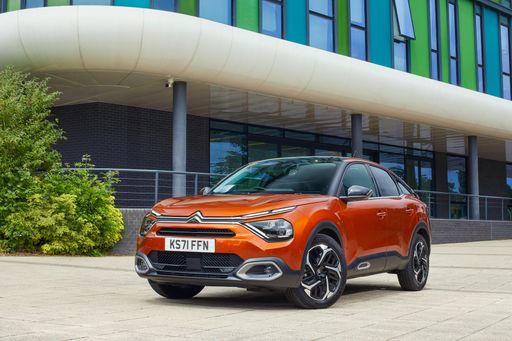
Citroen C4
Citroen C4
Citroën C4 wears its French eccentricity with confidence, pairing bold, sculpted styling with a supremely comfortable ride that turns mundane commutes into a gentler affair. If you value relaxed comfort, clever practicality and a car with personality rather than pretence, the C4 is a charming, sensible choice — and it won't make you miss the usual hot‑hatch theatrics.
details
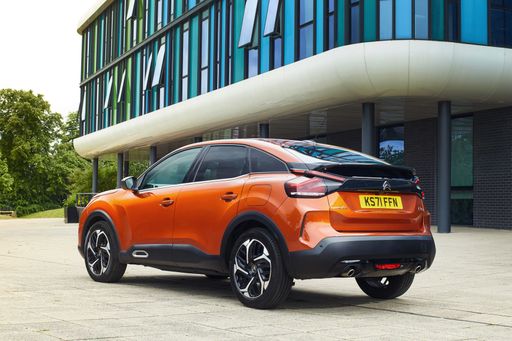
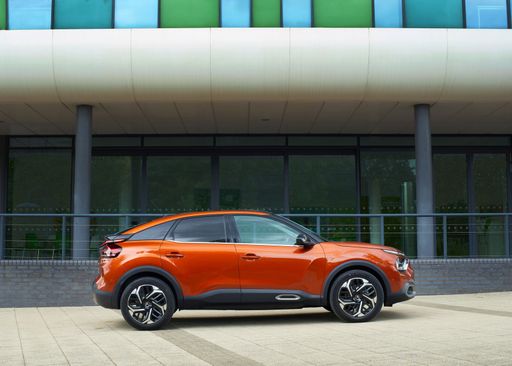
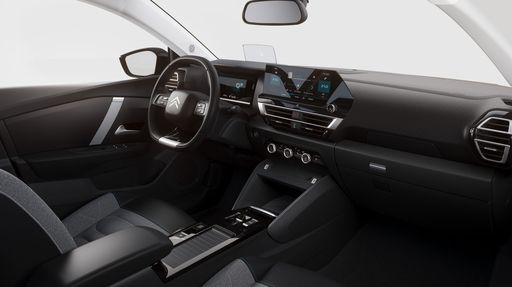
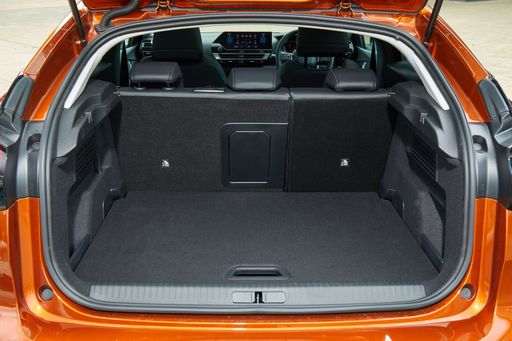
Toyota Yaris Cross
The Toyota Yaris Cross takes the jaunty personality of the Yaris and gives it a taller stance and a bit more practicality, so you get city-friendly agility with added SUV presence. It’s easy to live with, economical on the daily grind, and smartly packaged — a sensible pick for buyers who want fuss-free transport with a touch of character.
details






Costs and Consumption |
|
|---|---|
|
Price
20600 - 32000 £
|
Price
23700 - 34300 £
|
|
Consumption L/100km
4.7 - 4.8 L
|
Consumption L/100km
4.5 - 4.8 L
|
|
Consumption kWh/100km
14.5 - 15.3 kWh
|
Consumption kWh/100km
-
|
|
Electric Range
354 - 427 km
|
Electric Range
-
|
|
Battery Capacity
46 - 51 kWh
|
Battery Capacity
-
|
|
co2
0 - 108 g/km
|
co2
101 - 108 g/km
|
|
Fuel tank capacity
-
|
Fuel tank capacity
-
|
Dimensions and Body |
|
|---|---|
|
Body Type
SUV
|
Body Type
SUV
|
|
Seats
5
|
Seats
5
|
|
Doors
4 - 5
|
Doors
-
|
|
Curb weight
1403 - 1659 kg
|
Curb weight
1180 - 1290 kg
|
|
Trunk capacity
380 - 510 L
|
Trunk capacity
320 - 397 L
|
|
Length
4350 - 4580 mm
|
Length
-
|
|
Width
1800 - 1834 mm
|
Width
1765 mm
|
|
Height
1520 - 1525 mm
|
Height
-
|
|
Max trunk capacity
1250 - 1360 L
|
Max trunk capacity
-
|
|
Payload
379 - 406 kg
|
Payload
485 - 510 kg
|
Engine and Performance |
|
|---|---|
|
Engine Type
Electric, Petrol MHEV
|
Engine Type
Full Hybrid
|
|
Transmission
Automatic
|
Transmission
Automatic
|
|
Transmission Detail
Reduction Gearbox, Dual-Clutch Automatic
|
Transmission Detail
CVT
|
|
Drive Type
Front-Wheel Drive
|
Drive Type
Front-Wheel Drive, All-Wheel Drive
|
|
Power HP
110 - 156 HP
|
Power HP
116 - 130 HP
|
|
Acceleration 0-100km/h
8 - 10.8 s
|
Acceleration 0-100km/h
10.7 - 11.3 s
|
|
Max Speed
150 km/h
|
Max Speed
-
|
|
Torque
205 - 270 Nm
|
Torque
-
|
|
Number of Cylinders
3
|
Number of Cylinders
3
|
|
Power kW
81 - 115 kW
|
Power kW
85 - 96 kW
|
|
Engine capacity
1199 cm3
|
Engine capacity
1490 cm3
|
General |
|
|---|---|
|
Model Year
2025
|
Model Year
2026
|
|
CO2 Efficiency Class
A, C
|
CO2 Efficiency Class
C
|
|
Brand
Citroen
|
Brand
Toyota
|
What drivetrain options does the Citroen C4 have?
The Citroen C4 is offered with Front-Wheel Drive.
